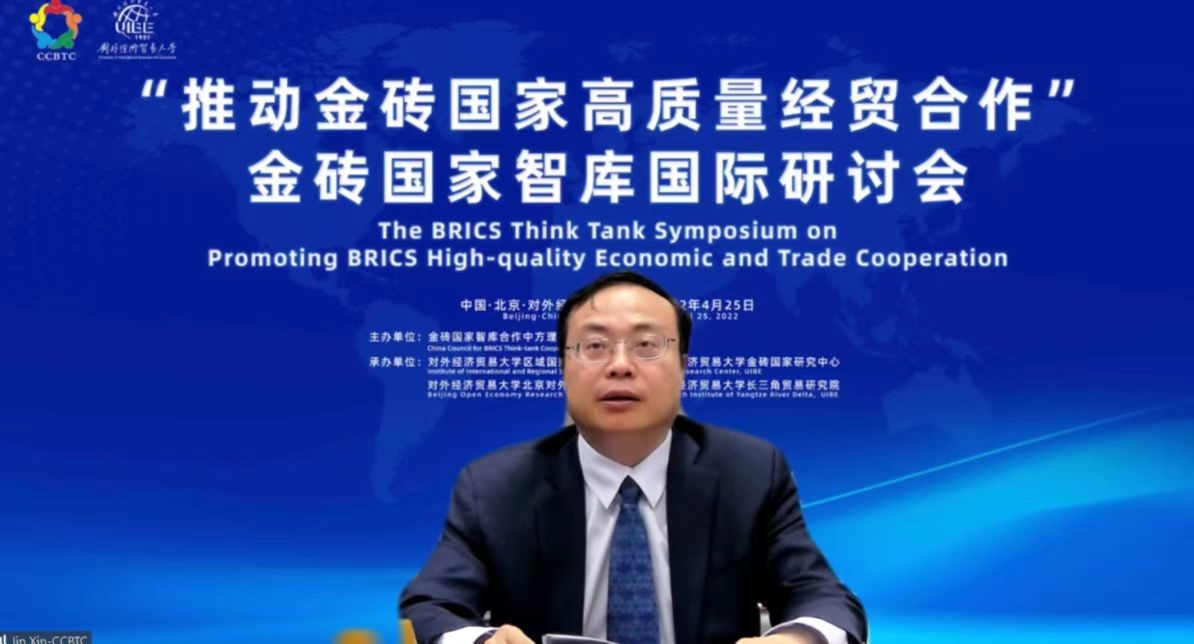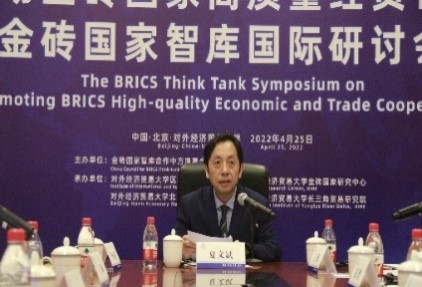First 2022 BRICS Think Tank Symposium Held

On April 25th, the first 2022 BRICS think tank symposium was held online. The meeting was hosted by China Council for BRICS Think-tank Cooperation (CCBTC), the Chinese coordinator for BRICS think tank cooperation, and organized by University of International Business and Economics (UIBE), the vice-chairman organization of CCBTC. BRICS scholars gathered online and shared their views on “promoting high-quality economic and trade cooperation among BRICS countries”.

Jin Xin, Secretary-General of CCBTC, director-general of the Research Office of the International Department of the CPC Central Committee, and Xia Wenbin, president of UIBE delivered speeches respectively. Jin Xin said that at present, changes and the pandemic unseen in a century are intertwined and interacting with each other. The international landscape is evolving fastly and the recovery of the world economy remains a daunting task. Economic globalization has suffered setbacks, which have caused serious impacts on all countries, especially emerging markets and developing countries, and brought new challenges to the 2030 Agenda for Sustainable Development. Faced with such complicated and ever-changing international situation, as an important force to promote the evolution of the international order, improve global governance and promote the development of all countries, BRICS countries should safeguard the common interests of emerging market countries and developing countries, and play a greater role in safeguarding and practicing true multilateralism, and promoting global economic recovery and sustainable development.
Under this background, Chinese President Xi Jinping put forward the Global Development Initiative at the UN General Assembly, which serves to draw a road map for solving the global development imbalance, provide an accelerator for advancing the 2030 Agenda for Sustainable Development, and has received warm response from the international community. In order to echo the concerns of all parties on development issues, China takes “Foster High-quality BRICS Partnership, Usher in a New Era for global Dvelopment” as the theme of 2022 BRICS cooperation, with the hope to work with all parties to build a more comprehensive, close and pragmatic BRICS partnership to jointly achieve stronger, greener and healthier global development. Economic and trade cooperation is a key area of cooperation among BRICS countries, and a higher level of economic and trade cooperation is a strong support for BRICS countries to jointly achieve high-quality and sustainable development. To promote high-quality economic and trade cooperation among BRICS countries: first, we should improve global economic governance and create a sound environment for international economic and trade cooperation; second, it is necessary to improve the level of economic, trade and financial cooperation and strengthen the ability to cope with external risks; third, we need to strengthen digital cooperation and create new highlights of economic and trade cooperation; fourth, we should develop green economic cooperation and help BRICS countries achieve green economic development.

Xia Wenbin said that global development cooperation is facing many unfavorable factors, and it is urgent for countries all over the world, especially emerging market countries as represented by BRICS, to deepen cooperation and enhance the influence of developing countries in international affairs. BRICS countries need to jointly promote global economic governance, maintain a fair and just world economic order, oppose all forms of trade and investment protectionism, strengthen development-oriented financial cooperation, cement high-quality economic and trade cooperation mechanisms, carry out international assistance cooperation on key issues such as famine, refugees, climate change and public health, build a “BRICS think tank community”, and realize the institutionalization and normalization of BRICS think tank cooperation. The University of International Business and Economics will continue to improve its research capability and think tank construction on BRICS, and make contributions to promoting high-quality economic and trade cooperation among BRICS countries, deepening BRICS partnership and South-South cooperation, and enhancing China’s open economy development in the new era.
Zhang Qi, member of the CCBTC and director-general of foreign economic research department, Development Research Center of the State Council, Sun Zhuangzhi, director-general of Institute of Russian, Eastern European & Central Asian Studies, Chinese Academy of Social Sciences, Wang Rongming, president of Shanghai University of International Business and Economics, Wang Qiang and Hong Junjie, vice presidents of University of International Business and Economics (UIBE), Tu Xinquan, dean of China Institute for WTO Studies, UIBE, Lan Qingxin, director of BRICS Research Center, UIBE, Xue Yi, director of scientific research department, UIBE, Zhao Dianlong, vice president of China Railway Construction Co., Ltd. and other Chinese representatives believe that in recent years, BRICS cooperation has maintained sound momentum, with fledging mechanisms and deepening cooperation, and is increasingly important for global economic development and governance system. At present, BRICS countries are facing a more complicated internal and external environment, and need to stick to true multilateralism, strengthen coordination and cooperation, and achieve mutual benefit and win-win results. Therefore, we should jointly carry out the innovation-driven development strategy, implement the Strategy for BRICS Economic Partnership 2025, actively participate in the discussion and negotiation of global trade and environment issues, promote the building of the BRICS PartNIR, and safeguard the broad interests of BRICS and developing countries.
Scholars from Brazil, Russia, India and South Africa believe that achieving sustainable development is the key to dealing with public health crisis, economic recession and climate change. Challenges that BRICS countries are facing at present are how to continue the economic recovery while fighting the Covid-19 pandemic, and how to keep the trade and investment open against the backdrop of unilateralism and populism. BRICS countries need to implement the Strategy for BRICS Economic Partnership 2025 and carry out “hard” cooperation in core areas such as finance, trade, investment, sustainable development, infrastructure and public health. At the same time, we will continue to carry out “soft” cooperation in sports, culture and education, and enhance people’s understanding of BRICS cooperation. For BRICS practical cooperation, scholars also put forward many suggestions, such as to establish an effective management mechanism to continue to promote sound internal cooperation, strengthen financial market development cooperation, use BRICS countries’ own currencies for trade settlement, use online platforms for direct or indirect financing, strengthen PPP cooperation, establish inter-government alliances to realize the new industrial revolution, jointly discuss green development and energy transformation, and build a carbon-neutral global economy.
The symposium is an integral part of the 2022 BRICS think tank exchange and cooperation programs, and has received strong support from all BRICS countries. Representatives from Institute for Applied Economic Research of Brazil, Russian National Committee on BRICS Research, Valdai International Discussion Club, Plekhanov Russian University of Economics, St Petersburg State University of Economics, Observer Research Foundation of India, Institute of Research and Information Systems of Developing Countries, Nelson Mandela University and Humanities Research Council of South Africa and other important BRICS think tanks and universities attended the meeting.
(Source: International Department. Central Committee of CPC)